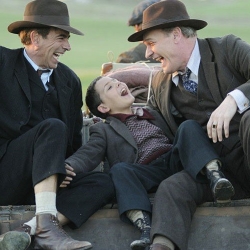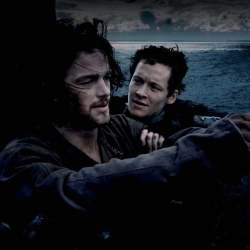

By Kim Voynar Voynar@moviecitynews.com
SIFF Dispatch: Last Review Round-Up
The Seattle International Film Festival has wrapped now, but I wanted to mention here a few other films that stood out from this year’s fest.
 Early in the fest I caught Red Eyes, a spectacularly shot and edited doc that follows the Chilean national soccer team, La Roja (The Red), on their eight-year quest to show the world they are as good at soccer as Brazil, Uruguay and Argentina, all of whom boast multiple World Cup wins, by qualifying for the World Cup in 2006, and again in 2010.
Early in the fest I caught Red Eyes, a spectacularly shot and edited doc that follows the Chilean national soccer team, La Roja (The Red), on their eight-year quest to show the world they are as good at soccer as Brazil, Uruguay and Argentina, all of whom boast multiple World Cup wins, by qualifying for the World Cup in 2006, and again in 2010.
If you dig sports docs, this one’s pretty awesome, and even if you’re not, stylistically it’s worth catching; I loved the way this film used both sound and visual editing to set emotional pacing and tone, particularly in the scenes of the team on the field fighting for World Cup honor. The film never really focuses on one or two characters enough to really connect the audience emotionally to any personal outcomes, but this fells like a deliberate attempt to narrow the focus to the idea of these guys as abstract representations of the national honor of their countrymen. In any case, Red Eyes is a stylish entry in the sports genre, and worth catching when it comes your way.
 I also caught Spanish film Paper Birds, which won the SIFF Golden Space Needle audience award for Best Film at the fest. The film is set just after the Spanish Civil war and tells the tale of a couple of circus performers, Jorge and Enrique, who’ve adopted a war orphan, Miguel, into their troupe, and their run-ins with the newly installed Franco regime. Visually, it’s quite a lovely film, with lots of sepia toning evoking old photographs, and the adult cast is superb in bringing to life both the lost art of vaudeville and the idea of friendship and loyalty in the shadow of oppression.
I also caught Spanish film Paper Birds, which won the SIFF Golden Space Needle audience award for Best Film at the fest. The film is set just after the Spanish Civil war and tells the tale of a couple of circus performers, Jorge and Enrique, who’ve adopted a war orphan, Miguel, into their troupe, and their run-ins with the newly installed Franco regime. Visually, it’s quite a lovely film, with lots of sepia toning evoking old photographs, and the adult cast is superb in bringing to life both the lost art of vaudeville and the idea of friendship and loyalty in the shadow of oppression.
First time feature director Emilio Aragón does a fine job of telling a tale that’s comedic within a greater tragedy — not an easy balance — but for me the story, while sincere, lapsed a bit too much into sentimentality near the end. It reminded me greatly of Roberto Begnini’s Life is Beautiful, and if that film knocked your socks off, chances are you, like the SIFF audience, will enjoy Paper Birds very much.
 Hot Coffee buzzed well at Sundance and the jury here liked it as well, giving it the Grand Jury Prize for documentary. The film focuses on the well-publicized — but little understood — case of the woman who sued McDonald’s after being burned by their coffee. Funny joke, or outrageous case of people suing over every little thing, everything that’s wrong with our legal system, right? That’s what the reaction of the people on the street who are interviewed for the film universally think … until they’re shown pictures of the burns inflicted upon the 79-year-old woman at the heart of the case, who was not driving, but sitting in a parked vehicle, when the 180 degree coffee spilled all over her lap, causing extensive third degree burns requiring numerous surgeries and skin grafts.
Hot Coffee buzzed well at Sundance and the jury here liked it as well, giving it the Grand Jury Prize for documentary. The film focuses on the well-publicized — but little understood — case of the woman who sued McDonald’s after being burned by their coffee. Funny joke, or outrageous case of people suing over every little thing, everything that’s wrong with our legal system, right? That’s what the reaction of the people on the street who are interviewed for the film universally think … until they’re shown pictures of the burns inflicted upon the 79-year-old woman at the heart of the case, who was not driving, but sitting in a parked vehicle, when the 180 degree coffee spilled all over her lap, causing extensive third degree burns requiring numerous surgeries and skin grafts.
But what this excellent documentary is really about how a corporation and the media spun a tragic story and made a joke out of it to deflect attention from a very real case, and how tort reform laws, media and big business all collude in protecting themselves at the expense of people who have been damaged by negligence. The film’s director, Susan Saladoff, previously worked as a trial lawyer representing injured people, and that’s evident in the way she systematically lays out her case and breaks down the complexities of tort law in ways that an average jury — or an average audience — can understand.
 I also enjoyed Touch, a film about Tam, a Vietnamese-American woman who job as a manicurist intersects her path with Brendan, a car mechanic who hopes that getting his greasy hands clean might save his faltering marriage to his driven attorney wife. Meanwhile Tam, unable to connect with the men she dates and emotionally isolated from her wheelchair-bound father — who both relies on her help and resents her for it, finds an emotional connection with Brendan as she doles out relationship advice while cleaning his nails.
I also enjoyed Touch, a film about Tam, a Vietnamese-American woman who job as a manicurist intersects her path with Brendan, a car mechanic who hopes that getting his greasy hands clean might save his faltering marriage to his driven attorney wife. Meanwhile Tam, unable to connect with the men she dates and emotionally isolated from her wheelchair-bound father — who both relies on her help and resents her for it, finds an emotional connection with Brendan as she doles out relationship advice while cleaning his nails.
There’s an excellently edited opening credit sequence that visually represents the idea of “touch” in its various incarnations, and while the storyline occasionally hits a bumpy patch, this is a solid directorial debut from Minh Duc Nguyen, anchored by some nice turns by the leads.
 And last but not least, I have to give a shout-out to what was perhaps the most surprising film at SIFF this year (for me at least), raucously delightful German pirate flick 12 Paces Without a Head. Based of stories about a pair of real folk-heros, the story follows a pair of pirates, once legendary but now faltering in their chosen career path, who stumble upon a secret weapon that reignites their passion for the job, even as leader Klaus struggles with wanting to retire to farming with his not-so-patiently waiting ladylove.
And last but not least, I have to give a shout-out to what was perhaps the most surprising film at SIFF this year (for me at least), raucously delightful German pirate flick 12 Paces Without a Head. Based of stories about a pair of real folk-heros, the story follows a pair of pirates, once legendary but now faltering in their chosen career path, who stumble upon a secret weapon that reignites their passion for the job, even as leader Klaus struggles with wanting to retire to farming with his not-so-patiently waiting ladylove.
I can’t say that I’m normally a huge fan of pirate movies, but director Sven Taddicken’s excellent pacing, storytelling, and use of both comedic and dramatic timing, along with some particularly creative use of score and soundtrack (a high seas cannonball fight set to Johnny Cash? What!?) really make this film stand out.
I’d love to see this film released in the US just as it is (it came out in Germany back in 2009, so not sure how likely that is), with all its dirt and gritty realism, but I could also picture, while watching it, an American remake starring Leo DiCaprio and Joseph Gordon-Levitt, to whom the lead actors bear quite a resemblance. As it stands, 12 Paces Without a Head is a rollicking good film, and if it comes your way you’ll want to catch it. Arggggh!
If you missed out on SIFF, you have one last chance to catch some of the great films from this year’s fest June 17-19, as SIFF puts on the Best of the Fest, a mix of jury and Golden Space Needle award winners and audience favorites. Full series passes are just $75 ($50 for SIFF members). See you at the cinema!














